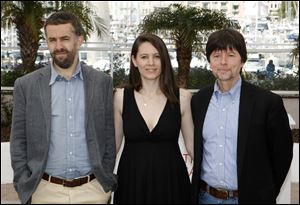
PBS revisits powerful case of injustice In The Central Park Five
4/16/2013
Directed by, from left, co-directors David McMahon, Sarah Burns and Ken Burns, the two-hour documentary makes the case that the five teens who were sent to jail, and whose convictions were eventually overturned, were wrongly convicted of the rape and beating of the woman who came to be known as the Central Park jogger.
No video cameras captured the “wolf pack” of teenagers that swept through Central Park beating and harassing New Yorkers on April 19, 1989.
But cameras were on later at the precinct where police were booking the youths they’d picked up for unlawful assembly. The black-and-white NYPD images from that night show scared black and Hispanic teenagers waiting for their parents to show up and take them home.
Then a 28-year-old white jogger was found raped and near death in the park, setting in motion one of the most spectacular failures of American justice in recent memory.
The Central Park Five, documentarian Ken Burns’ collaboration with his daughter and son-in-law, takes us back to the ugly racial reality of New York City in the late ’80s, the days of crack and “subway vigilante” Bernhard Goetz, when no one felt safe. It airs at 9 tonight on WGTE-TV, Channel 30.
Antron McCray, Kevin Richardson, Yusef Salaam, Raymond Santana, and Korey Wise ended up going to trial because they were the most naive among the kids rounded up that night and the next morning. They were the ones whose parents didn’t push back, who didn’t know that cops have carte blanche to lie during interrogations. (Never talk to the police without a lawyer. Just never.)
Eventually, they made a series of statements that never matched up with reality — or their co-defendants’ versions of the story. Detectives told them they would be witnesses and promised them that they could go home.
“He just fed it to me. ‘What did he do? What did Antron McCray do?’” recalls Santana, who was 14 at the time. “He gave me the names, I put ’em in. I couldn’t tell you who they were, who they looked like. If he would’ve gave me a hundred names, I would have put a hundred people at the crime scene.”
Around this time, politicians began chiming in. Mayor Ed Koch scornfully dismissed the word “alleged” as he mocked the teenagers’ families.
Nearly lost in the fear-mongering coverage of the city’s newspapers, beneath a headline that read “Koch Calls Them Monsters” was one small sidebar: “Suspect’s Tales Don’t Match Up.”
The film lays out the compelling case for the five teenagers’ innocence, which seems clear in hindsight but was so poorly presented at trial that it couldn’t overcome the weight of the confessions. One defense lawyer napped.
When police and prosecutors realized they had found the DNA of only one still-unknown attacker, they never checked it against Matias Reyes, a serial rapist who’d been stalking the Upper East Side near the park when he was arrested that August. It would have matched.
Instead, the teens watched the rape survivor testify in court, wishing she could remember what had happened to her. They were all convicted, with sentences ranging from five to 15 years.
Ronald Gold, a juror in the trial of the first three teens, remembers holding out for as long as he could during more than 10 days of deliberations. In the end, though, he gave in to escape the pressure, just as the defendants had.
But the Central Park Five had learned not to do that anymore, and they all refused to capitulate in parole hearings for early release. Wise, who got the longest sentence, was the only one still behind bars in 2001 when he ran across Reyes in prison. The Upper East Side Rapist had a crisis of conscience and confessed, tossing out details 13 years later that only the assailant could have known.
Manhattan District Attorney Robert Morgenthau threw out the Central Park Five’s convictions in 2002. Amazingly, prosecutors still insist they had the right guys.
Whatever cocktail of denial, butt-covering, and stubbornness is keeping New York City from settling the men’s civil lawsuit is a strong one. After refusing to cooperate with Burns, the city’s attorneys subpoenaed their unreleased footage based on the argument that the movie “crossed from documentary into pure advocacy.”
The city lost that argument, but there’s no doubt The Central Park Five is a movie with a mission.